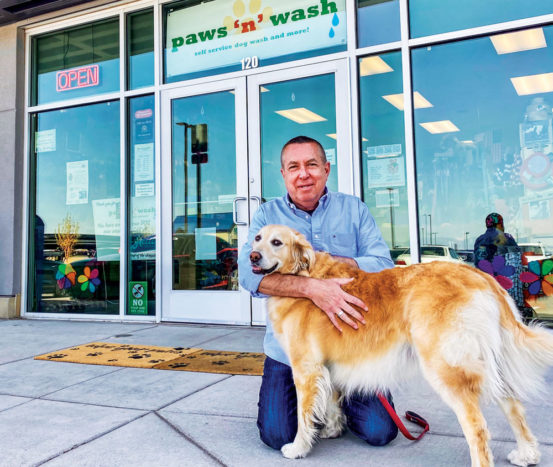
Bob Corman, owner of paws ‘n’ play natural pet supplies, says his Central Park store is struggling to survive, partly because of the high rent, which is double what he pays in Park Hill.
Bob Corman, owner of paws ‘n’ play natural pet supplies, opened his third Denver store in the Shops at Beeler Park in March 2020, just as the COVID-19 pandemic was shutting down businesses.
Corman said that entire year was rough—he had to forgo a paycheck for himself—but he managed to survive. Still, he says, two years later the store has yet to turn a profit because of the exorbitant rent he’s paying.
“I pay twice the rent for this store that I pay at my Park Hill location.” He says that he pays just over $50 a square foot in Central Park versus $25 in Park Hill. And the Central Park rent has risen every year, so much so that he’s had to renegotiate his small business loan. “I’m hanging in there. Thank God that the neighborhood has been so supportive of us.”
What has really angered Corman, however, is the broken promise by the developer to build a Walgreens in the shopping center.
“Small stores like ours depend on having an anchor store to bring in foot traffic,’’ he said. “The whole reason I signed a five-year lease on this property was because of that promise. There are four of us small business owners sitting here with no anchor store in sight.”
“We got bamboozled.”

Rental rates for retail stores in parts of Central Park are significantly higher than in neighboring Park Hill, leading to many empty storefronts.
Complaints about high rent and shoddy treatment of mom-and-pop stores in Central Park have flourished for years. In 2018, just after Central Park master developer Forest City was sold to Brookfield Asset Management, Central Park resident Mike Keuhler hoped to open a specialty cheese shop in the retail space where Edible Arrangements had been in the 29th Avenue Town Center.
“It was very timely,’’ he said. “The old tenants were leaving, and I had hoped to buy some of their shelving and coolers.”
He said he tried to contact Brookfield—both on the phone and in person—two dozen times and never got a response.
“It was embarrassing, but there was nothing I could do,’’ Keuhler said. “I realized that they don’t have any interest in working with small businesses. They want deep pockets.”
Keuhler ended up opening his shop, So Damn Gouda, in the Sunnyside neighborhood in north Denver where he says he pays about $30 a square foot, compared to Central Park’s higher rates which average around $47.
“I feel like I dodged a bullet by not ending up on 29th Avenue,’’ he said. “I’ve talked to other business owners in Central Park and they’re very unhappy. And I think it’s why you see businesses like Mason’s Dumpling Shop open up in Aurora instead.”
Unaffordable retail rents are the main reason Julie Bellina has kept her business, The Skin Care Studio, in her Central Park home for the past 10 years. An esthetician who specializes in acne and anti-aging skin treatments, Bellina says every few years she explores options to rent a space in the neighborhood so she could expand her business and hire additional employees.
“But it always ends up being thousands of dollars a month, and it just doesn’t make sense when this community is so open to home-based businesses.”
Brookfield didn’t respond to interview requests from Front Porch, but Robb Brown, owner of The Denver Retail Group did. Prior to forming his own commercial and multi-use real estate consulting company, he worked for Forest City. He said he doesn’t think that rent is much higher in Central Park than the rest of the city, especially if you consider retail space in Quebec Square, which is more affordable than Eastbridge or the Town Center.
“I realize that some retailers don’t want to be in a Walmart shopping center.’’ Brown said. “They want to be in a more high-end environment. But then you have to pay those higher prices.”
He also pointed out that Central Park’s 80238 zip code is one of the wealthiest neighborhoods in Denver, so developers believe they can attract tenants who cater to wealthier people.
Brown says he doesn’t shy away from working with mom-and-pop businesses, but he admits that some leasing companies do find it riskier. He says that’s because it can be harder to secure financing—either from investors or a traditional bank—if the small business doesn’t have a strong financial track record.
“As a landlord, I have to present the deal to a lender to be approved,’’ Brown said. “Let’s say an owner of a food truck decides he wants to open a restaurant in one of my properties, the bank might not approve the deal if the business owner has never run a restaurant before.”
Finally, Brown says he knows it’s easy to blame small business challenges on high rent, but he says there are many other factors that really determine the success or failure of the enterprise.
“The concept of high versus low rent is a classic but subjective discussion. In the end, the determination is based upon the sales performance of the location and the tenant’s ability to analyze their competition, offer the public a great product or experience and deliver elevated customer experience.”
That’s little comfort to business owner Corman who feels as if the rules of the game keep changing for small enterprises like his. “Something has to give. This is just a very tough time for small businesses to survive.”
Front Porch photos by Christie Gosch



0 Comments